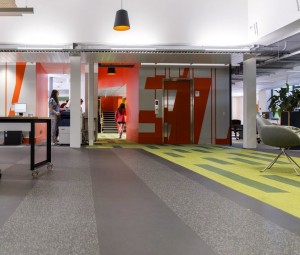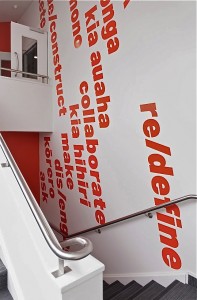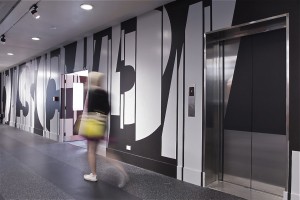Wellington Campus Library: New Space, New (and old) Ways of Working
May 5, 2015
Craig Cherrie, Creative Arts & Industries Librarian at the Wellington Campus, reflects on the changes to the Wellington Campus Library:
Half-a-semester on from the occupation of the full space of the ‘new’ Wellington Library, its timely to reflect on its reception to date by its prime users – students and academic staff.
Common wisdom is that it takes at least 12 months to ‘realise’ a space – people need time to explore and adapt, find their niche. The building itself also requires fine tuning – and there’s plenty of that still continuing with the building systems and fabric. Space, as any 2nd year spatial design student will tell you, is ‘socially produced’ and it’s been interesting to observe the various productions to date. Initially many looked for the familiar – a PC station with an ergonomic chair, or a quiet spot to retreat to. The more adventurous though started to play early on with different ways of inhabiting the place – perching on the ‘bar stools’ at the high benches, reconfiguring the tub chairs and laptop tables into intimate collaborations, tacking sheets up on clear white walls for ad hoc design sessions, or putting together their own, laid-back solo space – all facilitated by the improved, pervasive wifi and ever-present MacBook’s.
Others moved around like refugees for a period until they found their ideal niche and now head to it on a very regular basis. Some want to be both apart but also within a broader study ambience. There are even a few (a small minority) who are now favouring the distinctly old school environment of the Mezzanine. (No funds were available to develop this so it continues its 1970s grey, grungy feel and very retro, individual Formica study carrels – though brightened by new C21st LED lighting).
The ambient architectural design – robust, assertive, not hiding the base brutalism – has generally met favour and will we hope prove fairly timeless though there are a few who have lamented the lack of ‘proper’ finishing. But the conveyed narrative of hotter colours (orange, green …) signifying more active, noisier space contrasting with cooler whites and greys as quieter, more reflective space has worked well. Implied tikanga is largely observed and self-policed and we have kept to our ideal of no behavioural signage. There are always a few who want to preserve their early experience of a totally quiet library but that is not the 21st collaborative ethos. And we do have quieter space if they ask.
The environmental graphics – large swathes of words or very disrupted, almost abstracted text on walls – has not excited as much comment as I expected – maybe its all expected on the ‘creative campus’? When pressed though most volunteer that these do contribute to a stimulating, ‘cool’ or creative feel. For those who do ask me about them the graphics open up conversations about matters bicultural, or approaches to building knowledge in their academic pursuits. And the abstracted text has become our edgy brand that we can use on temporary signs.
Students are not only coming in greater numbers but also from my observation, staying longer. Recently my colleague Lauren Deacon and I presented a week long series of core information literacy sessions to all (380+) first year College of Creative Arts (CoCA) students in the old Museum building. I began each session by asking who had been to the Library; a reassuring 99% answered in the affirmative which wouldn’t have been the case a year ago. And the fact that they’re around more has resulted in more frequent requests for assistance. I have never experienced such a sustained level of Semester One research-related demands – from first and fourth years in particular. It was exhausting but rewarding. The ‘Service bar’ design has probably contributed to this. Students tell me they like the height and the bar-like feel which affords a less intimidating sidle up to us compared with the former sit down, low service counter. I often zip around the other side to lean on the bar with them for a less formal, reference interview type exchange.
Academic staff volunteer that they like spending time in the place. More are coming to hang out, view new materials and this offers opportunities to engage with them. One CoCA staff member has even been using the lounge spaces to run informal tutorial sessions.
So initial indicators are positive and reassuring. The Library seems to be starting to contribute more solidly to its planned role as one of the critical elements of the work-in-progress that is the Pukeahu campus heart.
Search posts
Categories
Tags
Recent Comments
- January 2026
- November 2025
- September 2025
- May 2025
- April 2025
- March 2025
- February 2025
- January 2025
- December 2024
- November 2024
- October 2024
- September 2024
- August 2024
- July 2024
- June 2024
- May 2024
- December 2023
- November 2023
- October 2023
- September 2023
- June 2023
- May 2023
- February 2023
- January 2023
- November 2022
- October 2022
- September 2022
- August 2022
- July 2022
- June 2022
- May 2022
- March 2022
- January 2022
- November 2021
- August 2021
- July 2021
- May 2021
- April 2021
- March 2021
- December 2020
- November 2020
- September 2020
- August 2020
- June 2020
- May 2020
- April 2020
- March 2020
- February 2020
- November 2019
- October 2019
- September 2019
- July 2019
- June 2019
- May 2019
- March 2019
- February 2019
- December 2018
- November 2018
- October 2018
- September 2018
- August 2018
- July 2018
- June 2018
- May 2018
- April 2018
- March 2018
- February 2018
- January 2018
- December 2017
- November 2017
- October 2017
- September 2017
- August 2017
- July 2017
- June 2017
- May 2017
- April 2017
- March 2017
- February 2017
- January 2017
- December 2016
- November 2016
- October 2016
- September 2016
- August 2016
- July 2016
- June 2016
- May 2016
- April 2016
- March 2016
- February 2016
- January 2016
- December 2015
- November 2015
- October 2015
- September 2015
- August 2015
- July 2015
- June 2015
- May 2015
- April 2015
- March 2015
- February 2015
- January 2015
- December 2014
- November 2014
- October 2014
- September 2014
- August 2014
- July 2014
- June 2014
- May 2014
- April 2014
- March 2014
- February 2014
- January 2014
- December 2013
- November 2013
- October 2013
- September 2013
- August 2013
- July 2013
- June 2013
- May 2013
- April 2013
- March 2013
- February 2013
- January 2013
- December 2012
- November 2012
- October 2012
- September 2012
- August 2012
- July 2012
- June 2012
- May 2012
- September 2009
- November 2008




Leave a Reply